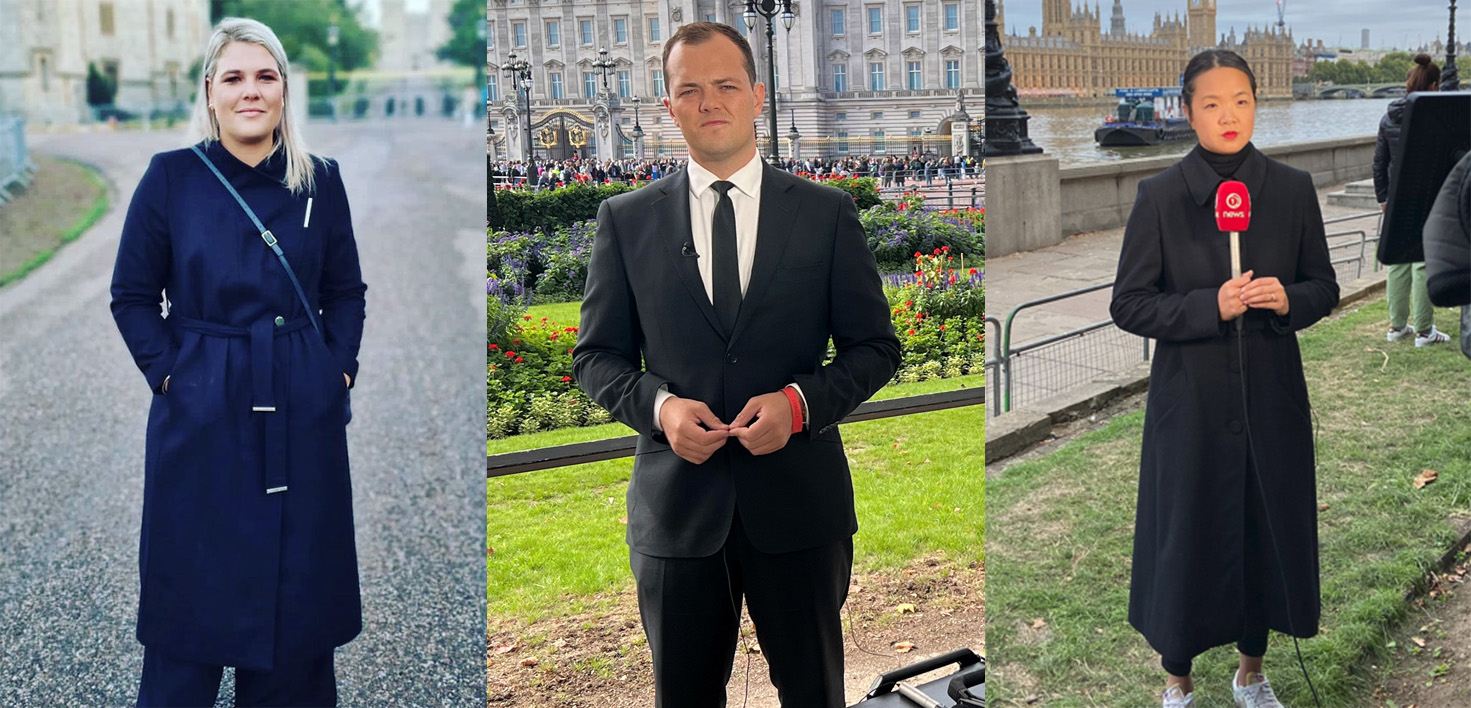Short years from study to covering the biggest news story on the planet
Three Ara Te Pūkenga New Zealand Broadcasting School students reflect on the whirl of covering the Queen’s funeral in London.

Working on the world’s biggest news event (L-R) Ara-Te Pukenga graduates Lisette Reymer, Mitch McCann and Mei Heron
Ask a broadcasting student to share their wildest dream – they're likely to say, 'to be a foreign correspondent'.
Such opportunities are rare on the New Zealand media landscape – but three recent Ara-Te Pūkenga New Zealand Broadcasting School (NZBS) graduates can not only claim that title, but can list covering one of the world’s biggest news events on their CV too.
When news broke of the Queen’s death, the roles of London correspondent for TVNZ and TV3, as well as TV3’s New York correspondent were filled by Ara - Te Pukenga alumni.
TVNZ’s Mei Heron, a 2013 graduate in Broadcasting Communications in Journalism, just landed the correspondent role only days before news of the Queen’s death. Heron had been taking over the reins from another NZBS graduate, Daniel Faitaua.
‘It has been a true baptism by fire. I have not even had time to process it. That‘s how crazy, amazing, spine-tingling, historic, it's all been,” she says.
At TV3, Lisette Reymer, a 2014 graduate who has been reporting on the Ukraine conflict, says the Queen’s death has “ruled her life” in recent times.
“I had cue cards with 'Queen facts' on them that I always carried in my handbag, so I could study anywhere,” she says.
“I always travelled with a black coat or blazer so I would have the right outfit to wear on air if the news came through out of the blue.”
That blazer got wrenched out of her bag in a hurry when, as she was due to deliver a general update in a camel-coloured coat at the gates of Buckingham Palace, an Iraqi correspondent next to her said, ‘she’s dead’.”
“I dropped the microphone, ripped off my coat and grabbed the black one,” she recalls.
“The producer in my earpiece said, ‘I see you are putting on black’ and that is how the news first made it to the New Zealand control room. The next time I slept was at midnight the following night.”
2015 NZBS graduate Mitch McCann had only just successfully got his pitch to be TV3’s New York correspondent over the line when he was told to pack his bags immediately and fly to London.
“I keep pinching myself,” he says. “We’re in live cross tents outside Buckingham Palace, lining up next to the giants of international broadcasting like CNN and BBC, and you are standing beside them thinking ‘wow, how the hell did I end up here?” McCann says.
Back in Christchurch, Kathryn McCully, Manager – NZBS, Art and Design says the department is delighted to see alumni reporting on such an historic event on the world stage.
She says having industry professionals delivering content in the programme is key to that.
“Our team is passionate about their roles in supporting learners to enter an industry that plays such a pivotal role in shaping our experience and understanding of the world,” McCully says.
The road to the stellar role of correspondent has been one of hard work for each of the graduates.
McCann recalls being told “the first five years of your career can set you up for the rest of it” while he was studying.
“I have remembered that and have tried to develop a very strong work ethic, whether that be working extra shifts, working weekends, or working harder on my technical on-air skills,” he says.
Heron describes her journey as “unconventional” with news, sport, political reporting and producing in radio before TV came calling.
“TVNZ scooped me up as a Wellington Reporter, then I started doing some Bureau Chief work and now I'm here as Europe Correspondent,” she says.
For Reymer, storytelling has been key.
“I have spent my career being incredibly greedy and soaking up as much of the genius in the newsroom around me as possible, so that no matter what story I was handed, I could tell it, "she says.
“Then, I try to make every story I tell make the viewer feel something.”
Asked how to sum up the whirlwind that has been the last fortnight, the correspondents choose words like privilege, incredible, demanding, emotional, and surreal.
As to what’s next, Reymer sums it up.
“I have given up trying to guess what might come next!” she says. “Wherever we are, whatever we are covering, we'll continue to do it justice with memorable stories.”